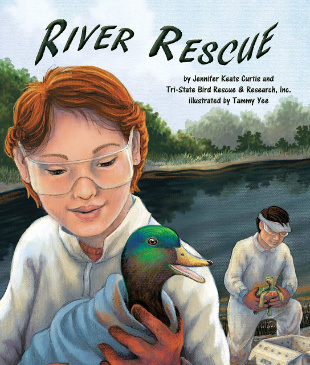Only a few organizations in the United States can save animals harmed by oil spills and leaks of diesel fuel, gasoline, or cooking oil. On the East Coast, the Oiled Wildlife Response Team at Tri-State Bird Rescue and Research always remains ready to rush to a scene where animals need care.
River Rescue, written for 6 - 9 year olds and filled with information for anyone who wants to know about the team's meticulous and demanding efforts, starts by telling readers how pelicans covered with oil can neither fly nor swim. They have special feathers that lock together to act as a drysuit. Without this layer, the pelicans get cold; when they try to clean their feathers, they ingest oil, which makes them sick.
Pelicans are relevant because they were the most common patients during the 2010 spill in the Gulf of Mexico, the largest spill taken on by the Tri-State rescuers. But Tammy Yee's detailed and realistic illustrations draw attention to the many other forms of wildlife living in or near water that can also become covered in oil: ducks, geese, herons, frogs, turtles, fish, salamanders, crayfish, dragonflies, and horseshoe crabs.
When Tri-State gets a call for help, they bring as many creatures as possible to their "Emergency Room," where vets and assistants do triage. We see the workers in protective suits with goggles, because these oils hurt people, too.
Perhaps the most heart-wrenching pages tell us: "These are wild animals, and they don't want to be here. They don't feel well and are probably afraid of people." The look of tender-loving care on a vet's face as she holds an injured eagle in a blanket reflects the strength, compassion, and know-how necessary for this work.
The know-how includes skillful attention to details like the animal's age, what kind of oil is on him, whether it's all over or just in spots, whether it's also in his mouth, and whether he's wheezing. The intensive treatments are specific to each animal and his or her condition, but they always involve washing and rinsing, moving the animal gently through as many as six carefully heated tubs, and using gentle tools like soft toothbrushes and cotton swabs to remove the oil. While animals recover afterwards, they need special conditions tailored to them; for instance, birds accustomed to flocks will be kept in an area with other birds.
Tri-State releases the animals where they were first found, if possible. If that spot is not clean of oil, they will take them somewhere nearby. Release is their favorite part of the process, and they note, "We hope we won't see them again, but if they need us, we'll be here."
The back of this informative book shares ideas for preventing oil spills, an animal identification quiz, and a Q&A with Tri-State Executive Director Lisa Smith. Her advice includes calling a licensed wildlife rehabilitator if you find an oiled animal. In the U.S., you can call the National Response Center at (800) 424-8802.
We long for a day when this kind of work will no longer be necessary. In the meantime, we remain awestruck at the quiet, persistent heroism of the Tri-State team and others like them whose life-giving skills bring awareness and inspire hope in young people and all of us.
